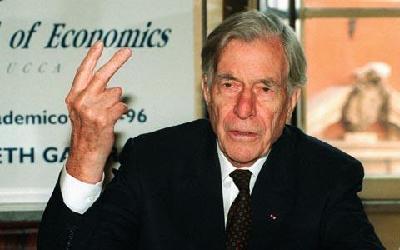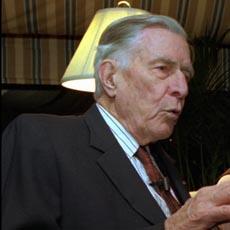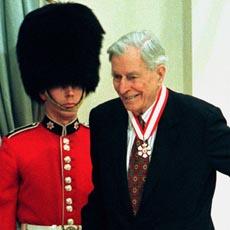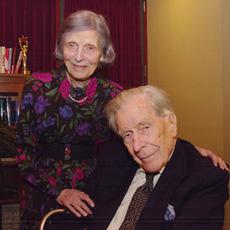
STEVE EMBER: I'm Steve Ember.
BARBARA KLEIN: And I'm Barbara Klein with PEOPLE IN AMERICA in VOA Special English. Economics is a field based on mathematics. Yet it cannot provide answers to every problem. Some people question whether economics is a science at all.
For many years, possibly the loudest critic was himself an economist, John Kenneth Galbraith.
(MUSIC)
STEVE EMBER: John Kenneth Galbraith was an economist, liberal thinker, author, professor, presidential advisor and ambassador. He stood over two meters tall. He was excellent at arguing positions and making complex ideas understandable. These two qualities made Mr. Galbraith a powerful personality able to influence people at the highest levels of government.
He was also a productive writer and an effective critic of many popular ideas of his time. For some, he was an easy person to dislike. He was very sure of himself and his arguments. Yet, he clearly influenced the economic ideas of many people, including politicians and presidents.

BARBARA KLEIN: John Kenneth Galbraith was born on a farm near Iona Station, Canada in 1908. It was a long way from the East Coast of the United States and the political power centers he would come to influence. He learned about politics from his father, William Archibald Galbraith, who was a farmer. He also served in many local government positions and was a community leader. John once said that his mother, Sarah Catherine Kendall Galbraith, wanted him to be a farmer also. But she died when he was 14.
STEVE EMBER: Young John first studied agriculture at Ontario Agricultural College. But he soon found economics more interesting. His studies led him to the University of California at Berkeley. He got a doctorate degree in agricultural economics in 1934.
In his early years, Mr. Galbraith was greatly influenced by the economist Thorstein Veblen and his book, "The Theory of the Leisure Class." Mr. Veblen argued that people gathered wealth for the purpose of "conspicuous consumption." He meant that people earned money to spend on valuable things to gain respect in society.
Mr. Galbraith said he was also deeply affected by the economic disaster that was expanding around him and across the country: The Great Depression.
(MUSIC)
The Great Depression severely affected the American economy and society. At the height of the Depression, at least one in five Americans did not have a job.
(MUSIC)
BARBARA KLEIN: Mr. Galbraith became an instructor at Harvard University in Cambridge, Massachusetts. In 1937, he became an American citizen. He married Catherine Atwater, the daughter of a New York lawyer. They later had four sons.
That year, Mr. Galbraith also went to England to study under the most influential economist of the 20th century. John Maynard Keynes was teaching at Cambridge University at the time.
He had published the "General Theory of Employment, Interest and Money" the year before. Mr. Keynes argued that deep economic crises required strong measures by the government. He said large public works projects and government price controls were needed to increase employment during economic downturns.
STEVE EMBER: In 1939, John Kenneth Galbraith began working for the government. He joined the National Defense Advisory Committee in Washington. He later was in charge of controlling prices for the Office of Price Administration.

Mr. Galbraith held the powerful position of top price controller in the administration of Franklin Delano Roosevelt. In 1943, however, he was forced to resign from the job. Later, he would say that he had been ousted by the politics of price control.
The same year, Mr. Galbraith started writing for Fortune magazine, which was owned by noted conservative Henry Luce. Mr. Galbraith developed into a highly skilled writer. Even his strongest critic praised his writing ability, even if they did not agree with what he wrote.
BARBARA KLEIN: Near the end of World War Two, Mr. Galbraith took part in the Strategic Bombing survey. The study was meant to measure the effectiveness of the American bombing campaign against Germany. He angered many people by saying that the bombing had done little to halt the German war effort. He found the Germans had simply moved industrial operations to new places after the bombing.
(MUSIC)
STEVE EMBER: In 1958, Mr. Galbraith published his most famous book, "The Affluent Society." He argued that while private individuals in America were becoming wealthier, public institutions were growing poor. He criticized the American culture that he said was rich in goods but poor in social services.
Mr. Galbraith also used the term "conventional wisdom" in the book. This term describes an idea that everyone accepts as true, but is not closely considered or examined.
"The Affluent Society" created a lot of discussion at the time. Critics said the book forced the nation to reexamine its values. It is still considered an excellent example of reasoning and writing.
BARBARA KLEIN: Mr. Galbraith was also involved in politics, which was unusual for an economist. He wrote speeches for Democratic presidential candidate Adlai Stevenson during two campaigns in the 1950s. Mr. Galbraith later became a trusted adviser to President John F. Kennedy.
President Kennedy appointed him ambassador to India in 1961. Thirty years later, Mr. Galbraith received India's second-highest civilian honor for his work to strengthen ties between India and the United States.
STEVE EMBER: The years working for the Kennedy Administration were happy times. But on November 22nd, 1963, President Kennedy was assassinated in Dallas, Texas.
Vice President Lyndon Johnson took office after the tragedy. Mr. Galbraith had good relations with the new president and became an adviser. But that lasted only until the war in Vietnam became the biggest issue in the United States. Mr. Galbraith opposed the involvement of the United States in the war. He spoke about that time.

JOHN KENNETH GALBRAITH: "I liked Lyndon Johnson very much. And I respected him as a man who combined intelligence with a will to action--a wonderful combination. And so breaking with him in the mid to late 1960s on the issue of Vietnam was something I regretted very much."
Public opposition to the war in Vietnam caused President Johnson not to seek another term in office. The issue of the war caused Mr. Galbraith to become active in politics again. He supported the anti-war presidential candidate Eugene McCarthy.
He even nominated Mr. McCarthy at the Democratic Party Convention in Chicago, Illinois, in 1968. Mr. Galbraith would later say: "I was more strongly moved by the need for opposition to Vietnam than any other major issue of my lifetime."
(MUSIC)
BARBARA KLEIN: In the years after the Vietnam War, Ken Galbraith put his energy into writing. He debated conservative thinkers such as his friend William F. Buckley, Junior. And he continued to advise Democratic Presidents.
In 1996, his book "The Good Society" was published. It was an update of his book "The Affluent Society." He wrote that his earlier concerns had worsened. The United States had become even more a place for the wealthy, or a "democracy of the fortunate."
In all, he wrote more than 30 books during his career. In 2000, President Bill Clinton recognized Mr. Galbraith's service by awarding him the Medal of Freedom.
STEVE EMBER: John Kenneth Galbraith died in 2006 at the age of 97. William F. Buckley said his friend was more interested in the social and ethical questions related to economics. Mr. Galbraith's books lack the mathematical and statistical research found in most works on economics. Yet they remain excellent examples of thinking about social responsibility and ethics.
One of his most famous criticisms of his profession was this: "Economics is extremely useful as a form of employment for economists."
(MUSIC)
BARBARA KLEIN: This program was written and produced by Mario Ritter. You can download this program and others from our Web site, voaspecialenglish.com. I'm Barbara Klein.
STEVE EMBER: And I'm Steve Ember. Join us again next week for PEOPLE IN AMERICA in VOA Special English.
Remembering two voices of the 20th century
American history: Roosevelt aims for economic security with 'second new deal'
Bernanke meets the press in a first for US Central Bank
(來(lái)源:VOA 編輯:崔旭燕)
